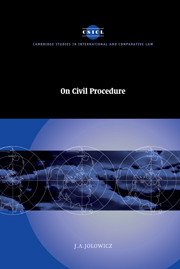Book contents
- Frontmatter
- Contents
- Preface
- List of abbreviations
- Introduction
- I The litigation process
- II Protection of diffuse, fragmented and collective interests
- III Procedural modes
- IV The parties and the judge
- V Recourse against judgments
- VI Procedural reform
- 17 ‘General ideas’ and the reform of civil procedure
- 18 Reform of English civil procedure: a derogation from the adversary system?
- 19 The Woolf reforms
- Index
- CAMBRIDGE STUIDES IN INTERNATIONAL AND COMPARATIVE LAW
18 - Reform of English civil procedure: a derogation from the adversary system?
from VI - Procedural reform
Published online by Cambridge University Press: 18 December 2009
- Frontmatter
- Contents
- Preface
- List of abbreviations
- Introduction
- I The litigation process
- II Protection of diffuse, fragmented and collective interests
- III Procedural modes
- IV The parties and the judge
- V Recourse against judgments
- VI Procedural reform
- 17 ‘General ideas’ and the reform of civil procedure
- 18 Reform of English civil procedure: a derogation from the adversary system?
- 19 The Woolf reforms
- Index
- CAMBRIDGE STUIDES IN INTERNATIONAL AND COMPARATIVE LAW
Summary
Introduction
In an earlier chapter it was said to be almost an article of faith on the part of common lawyers that, because their civil procedure is ‘adversarial’, it is therefore superior to the ‘inquisitorial’ system which they believe to exist elsewhere. In this chapter, following a brief account of the legacy of the jury as the source of our enduring loyalty to the adversary system, attention will be directed to a number of developments which occurred before, and are not superseded by, the Woolf reforms and which, it is believed, have a tendency to undermine the tenets of the adversary system as traditionally understood. The final chapter considers the impact of the reforms following that report.
Three legacies of the jury
The great period of reform of the nineteenth century reached its culmination on 1 January 1876, when the Supreme Court of Judicature Acts 1873-5 came into force. Those Acts laid the foundation of the judicial organisation and created the structure of civil procedure which have endured to the present time, but they did not mark a complete break with the past. Certainly our civil procedure was cleansed of its worst technicalities and some elements of the old equity procedure found a place in the new uniform procedure, but the underlying idea on which the new procedure was constructed was that of the old common law, with its insistence that questions of fact must be decided by a jury.
- Type
- Chapter
- Information
- On Civil Procedure , pp. 373 - 385Publisher: Cambridge University PressPrint publication year: 2000



